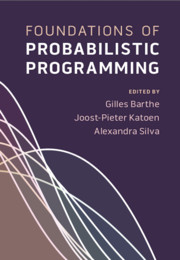Book contents
- Frontmatter
- Contents
- List of Contributors
- Preface
- 1 Semantics of Probabilistic Programming: A Gentle Introduction
- 2 Probabilistic Programs as Measures
- 3 Application ofComputable Distributions to the Semantics of Probabilistic Programs
- 4 On Probabilistic λ-Calculi
- 5 Probabilistic Couplings from Program Logics
- 6 Expected Runtime Analyis by Program Verification
- 7 Termination Analysis of Probabilistic Programs with Martingales
- 8 Quantitative Analysis of Programs with Probabilities and Concentration of Measure Inequalities
- 9 The Logical Essentials of Bayesian Reasoning
- 10 Quantitative Equational Reasoning
- 11 Probabilistic Abstract Interpretation: Sound Inference and Application to Privacy
- 12 Quantitative Information Flow with Monads in Haskell
- 13 Luck: A Probabilistic Language for Testing
- 14 Tabular: Probabilistic Inference from the Spreadsheet
- 15 Programming Unreliable Hardware
2 - Probabilistic Programs as Measures
Published online by Cambridge University Press: 18 November 2020
- Frontmatter
- Contents
- List of Contributors
- Preface
- 1 Semantics of Probabilistic Programming: A Gentle Introduction
- 2 Probabilistic Programs as Measures
- 3 Application ofComputable Distributions to the Semantics of Probabilistic Programs
- 4 On Probabilistic λ-Calculi
- 5 Probabilistic Couplings from Program Logics
- 6 Expected Runtime Analyis by Program Verification
- 7 Termination Analysis of Probabilistic Programs with Martingales
- 8 Quantitative Analysis of Programs with Probabilities and Concentration of Measure Inequalities
- 9 The Logical Essentials of Bayesian Reasoning
- 10 Quantitative Equational Reasoning
- 11 Probabilistic Abstract Interpretation: Sound Inference and Application to Privacy
- 12 Quantitative Information Flow with Monads in Haskell
- 13 Luck: A Probabilistic Language for Testing
- 14 Tabular: Probabilistic Inference from the Spreadsheet
- 15 Programming Unreliable Hardware
Summary
This chapter is a tutorial about some of the key issues in semantics of the first-order aspects of probabilistic programming languages for statistical modelling – languages such as Church, Anglican, Venture and WebPPL. We argue that s-finite measures and s-finite kernels provide a good semantic basis.
Keywords
- Type
- Chapter
- Information
- Foundations of Probabilistic Programming , pp. 43 - 74Publisher: Cambridge University PressPrint publication year: 2020
- Creative Commons
- This content is Open Access and distributed under the terms of the Creative Commons Attribution licence CC-BY 4.0 https://creativecommons.org/cclicenses/
- 4
- Cited by

